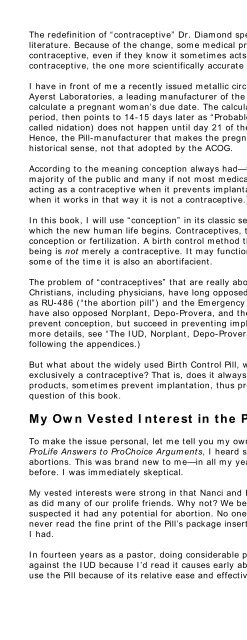Does the Birth Control Pill Cause Abortions
Does the Birth Control Pill Cause Abortions
Does the Birth Control Pill Cause Abortions
You also want an ePaper? Increase the reach of your titles
YUMPU automatically turns print PDFs into web optimized ePapers that Google loves.
The redefinition of “contraceptive” Dr. Diamond speaks of has gradually crept into <strong>the</strong> medical<br />
literature. Because of <strong>the</strong> change, some medical professionals will state <strong>the</strong> <strong>Pill</strong> is only a<br />
contraceptive, even if <strong>the</strong>y know it sometimes acts to prevent implantation. But <strong>the</strong> old meaning of<br />
contraceptive, <strong>the</strong> one more scientifically accurate and distinct, is also still widely used.<br />
I have in front of me a recently issued metallic circular “Pregnancy Calculator,” produced by Wyeth-<br />
Ayerst Laboratories, a leading manufacturer of <strong>the</strong> <strong>Pill</strong>. These are routinely used by Ob/GYNs to<br />
calculate a pregnant woman’s due date. The calculator points to <strong>the</strong> first day of <strong>the</strong> last menstrual<br />
period, <strong>the</strong>n points to 14-15 days later as “Probable Day of Conception.” However, implantation (also<br />
called nidation) does not happen until day 21 of <strong>the</strong> new cycle, six or seven days after conception.<br />
Hence, <strong>the</strong> <strong>Pill</strong>-manufacturer that makes <strong>the</strong> pregnancy calculator still defines “conception” in its<br />
historical sense, not that adopted by <strong>the</strong> ACOG.<br />
According to <strong>the</strong> meaning conception always had—which is <strong>the</strong> meaning still held to by <strong>the</strong> vast<br />
majority of <strong>the</strong> public and many if not most medical professionals—<strong>the</strong>re is no way any product is<br />
acting as a contraceptive when it prevents implantation. (Call it a contra-implantive, if you wish, but<br />
when it works in that way it is not a contraceptive.)<br />
In this book, I will use “conception” in its classic sense—as a synonym for fertilization, <strong>the</strong> point at<br />
which <strong>the</strong> new human life begins. Contraceptives, <strong>the</strong>n, are chemicals or devices that prevent<br />
conception or fertilization. A birth control method that sometimes kills an already conceived human<br />
being is not merely a contraceptive. It may function as a contraceptive some or most of <strong>the</strong> time, but<br />
some of <strong>the</strong> time it is also an abortifacient.<br />
The problem of “contraceptives” that are really abortifacients is not a new one. Many prolife<br />
Christians, including physicians, have long opposed <strong>the</strong> use of Intra-Uterine Devices (IUDs), as well<br />
as RU-486 (“<strong>the</strong> abortion pill”) and <strong>the</strong> Emergency Contraceptive <strong>Pill</strong> (ECP). Some, though not all,<br />
have also opposed Norplant, Depo-Provera, and <strong>the</strong> “Mini-pill,” all of which sometimes or often fail to<br />
prevent conception, but succeed in preventing implantation of <strong>the</strong> six day old human being. (For<br />
more details, see “The IUD, Norplant, Depo-Provera, RU-486, and <strong>the</strong> Mini-<strong>Pill</strong>,” in <strong>the</strong> addendum<br />
following <strong>the</strong> appendices.)<br />
But what about <strong>the</strong> widely used <strong>Birth</strong> <strong>Control</strong> <strong>Pill</strong>, with its combined estrogen and progestin. Is it<br />
exclusively a contraceptive That is, does it always prevent conception Or does it, like o<strong>the</strong>r<br />
products, sometimes prevent implantation, thus producing an early abortion That is <strong>the</strong> central<br />
question of this book.<br />
My Own Vested Interest in <strong>the</strong> <strong>Pill</strong><br />
To make <strong>the</strong> issue personal, let me tell you my own story. In 1991, while researching my book<br />
ProLife Answers to ProChoice Arguments, I heard someone suggest that birth control pills can cause<br />
abortions. This was brand new to me—in all my years as a pastor and a prolifer, I had never heard it<br />
before. I was immediately skeptical.<br />
My vested interests were strong in that Nanci and I used <strong>the</strong> <strong>Pill</strong> in <strong>the</strong> early years of our marriage,<br />
as did many of our prolife friends. Why not We believed it simply prevented conception. We never<br />
suspected it had any potential for abortion. No one told us this was even a possibility. I confess I<br />
never read <strong>the</strong> fine print of <strong>the</strong> <strong>Pill</strong>’s package insert, nor am I sure I would have understood it even if<br />
I had.<br />
In fourteen years as a pastor, doing considerable premarital counseling, I always warned couples<br />
against <strong>the</strong> IUD because I’d read it causes early abortions. I typically recommended young couples<br />
use <strong>the</strong> <strong>Pill</strong> because of its relative ease and effectiveness.



